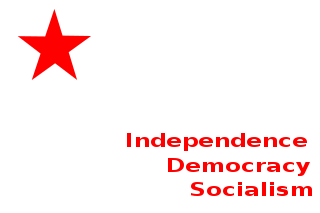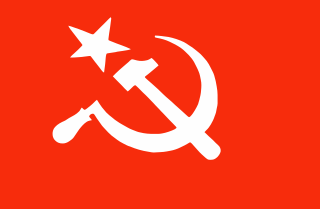Related Research Articles

The Communist Party of India (Marxist) is a communist political party in India. It is the largest communist party of India in terms of membership and electoral seats and one of the national parties of India. The party emerged from a split in the Communist Party of India (CPI) on 7 November 1964. As of 2022, CPI(M) is a part of ruling alliances in two states — the Left Democratic Front in Kerala and the Secular Progressive Alliance in Tamil Nadu. CPIM has representation in the legislative assemblies of 9 states.

The Communist Party of India (CPI) is the oldest communist party in India and one of the eight national parties in the country. The CPI was founded in Kanpur on 26 December 1925.

The Students' Federation of India is an Indian left-wing student organisation, politically aligned to the ideology and political views of the Communist Party of India (Marxist). Currently, V. P. Sanu and Mayukh Biswas are elected as the All India President and General Secretary respectively. SFI is the Largest Students' Organization in India and also in the world with more than 4 million Members.

Rajiv Gandhi Institute of Technology, Kottayam, India (RIT) is a government engineering college owned and operated by the Government of Kerala. Located 14 km from Kottayam near Pampady, the institute was founded in 1991 by the Government of Kerala with a view of making it a centre of postgraduate and research studies. It was named after Shri Rajiv Gandhi, former Prime Minister of India.
Indian Science Congress Association(ISCA) is a premier scientific organisation of India with headquarters at Kolkata, West Bengal. The association started in the year 1914 in Kolkata and it meets annually in the first week of January. It has a membership of more than 30,000 scientists.

The constitutional power to create new states and union territories in India is solely reserved to the Parliament of India. Parliament can do so by announcing new states/union territories, separating territory from an existing state or merging two or more states/union territories or parts of them. In addition to the existing 28 states and 8 union territories, some new states and union territories of India have at various times been proposed to be established.

All Assam Students' Union or AASU is a students' organisation in Assam, India. It is best known for leading the six-year Assam Movement against illegal immigrants from Bangladesh. The leadership, after the historic Assam Accord of 1985,

The Socialist Unity Centre of India (Communist) or SUCI(C), previously called the Socialist Unity Centre of India and "Socialist Unity Centre" is an anti-revisionist Marxist-Leninist communist party in India. The party was founded by Shibdas Ghosh, Nihar Mukherjee and others in 1948.

The Unification of Karnataka refers to the formation of the Indian state of Karnataka in 1956 when several Indian states were created by redrawing borders based on linguistic demographics. Decades earlier, during British rule the demand for a state based on Kannada demographics had been made.
Communism in India (1925–1964) has existed as a social or political ideology as well as a political movement since at least as early as the 1920s. In its early years, communist ideology was harshly suppressed through legal prohibitions and criminal prosecutions. Eventually, communist parties became ensconced in national party politics, sprouting several political offshoots.

The following outline is provided as an overview of, and topical guide to, India:

The National Students Union of India NSUI, the student wing of the Indian National Congress, was established on 9 April 1971. The organisation was founded by Indira Gandhi after merging the Kerala Students Union and the West Bengal State Chhatra Parishad to form a national students' organisation. Currently, As per Enrollment of Memberships, NSUI is Largest Student Organisation in India. Others are Akhil Bharatiya Vidyarthi Parishad and Students' Federation of India

M. P. Parameswaran is an Indian nuclear engineer and educationist. He played an important role in the Indian Nuclear program.
Indian Institutes of Information Technology (IIITs) are a group of 25 interdisciplinary technology-based-engineering research institutions in India which are focused on information technology. Five of them are established, funded and managed by the Ministry of Education (MOE). The other 20 are set up on the public-private partnership (PPP) model, funded by the central government, state governments and industry partners in the ratio 50:35:15.
The people's science movement (PSM) aims to popularise science and scientific outlook among common people. Kerala Sasthra Sahithya Parishad, Bharat Gyan Vigyan Samiti, Assam Science Society, Bigyan Prachar Samithy (Orissa), We the Sapiens and the All India Peoples Science Network are some popular people's science movements in India.
National Alliance of People's Movements is an alliance of progressive people's organizations and movements in India. It is an umbrella organisation for a larger alliance integrating various civil society organisations and individuals working towards similar goals.

The States Reorganisation Act, 1956 was a major reform of the boundaries of India's states and territories, organising them along linguistic lines.
The Golaghat Convention was a historic national convention of the people of Assam, organised in Golaghat for 2 days from 13–14 October 1985.

The Citizenship Amendment Act (Bill) protests, also known as the CAA Protest, CAB Protest or CAA and NRC protests, occurred after the Citizenship Amendment Act (CAA) was enacted by the Government of India on 12 December 2019. The move sparked a widespread national and overseas ongoing protests against the act and its associated proposals of the National Register of Citizens (NRC). The protests first began in Assam and spread swiftly in other states such as Delhi, Meghalaya, Arunachal Pradesh, and Tripura on 4 December 2019. Protests broke out rapidly across the country, although the concerns of the protesters vary.

The Kerala Students Union is a students organization in Kerala, India. It functions as the student wing of the Indian National Congress in the state.